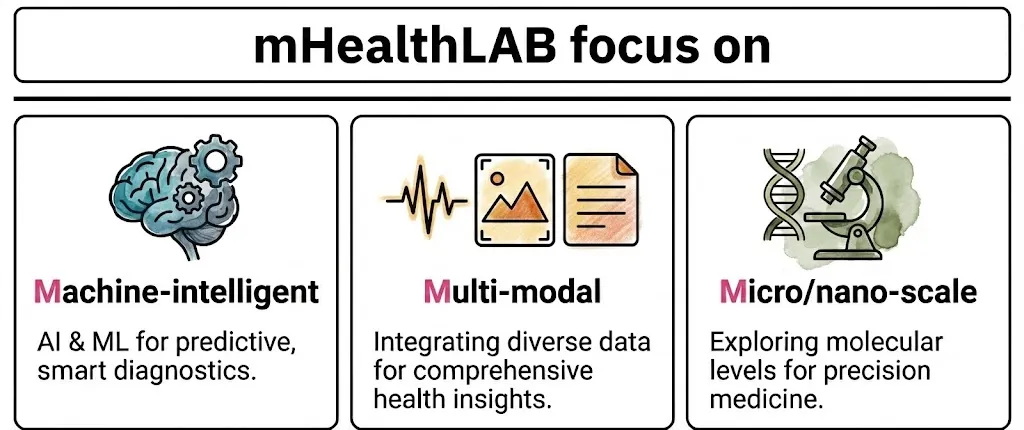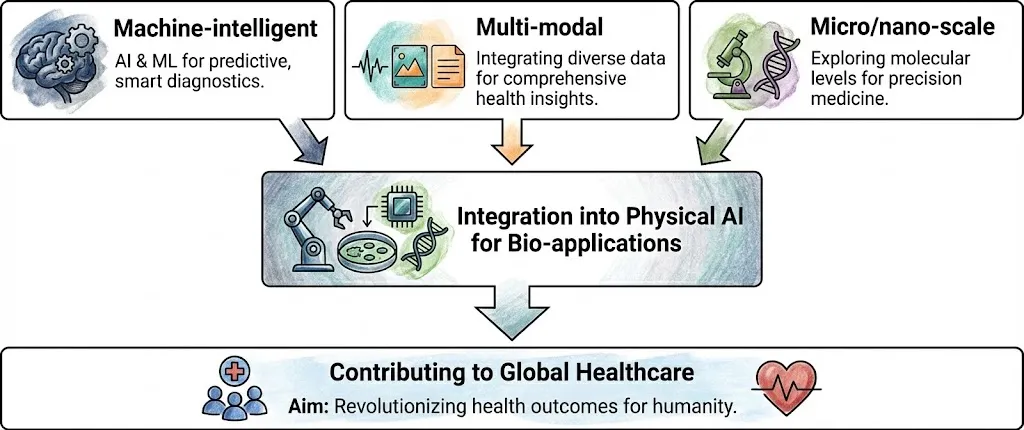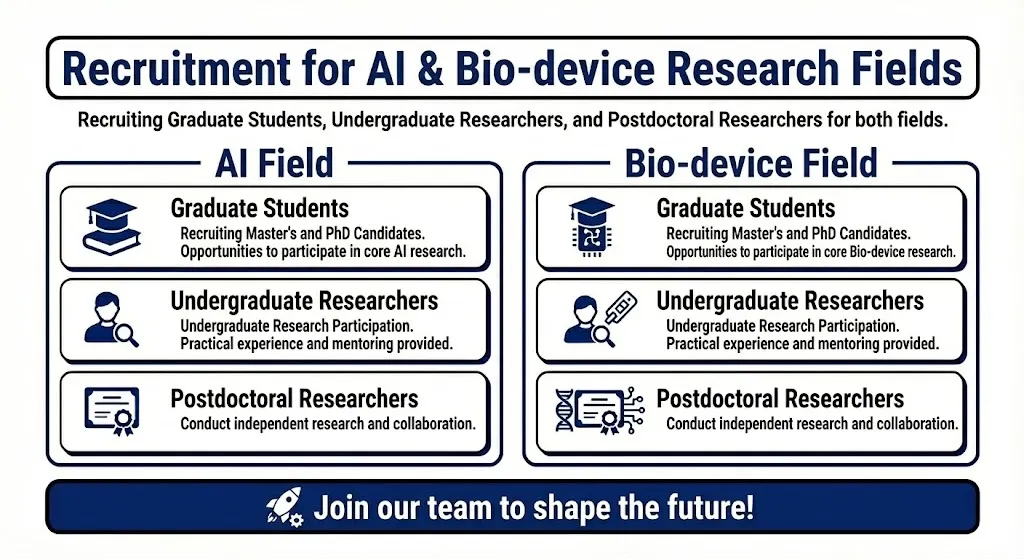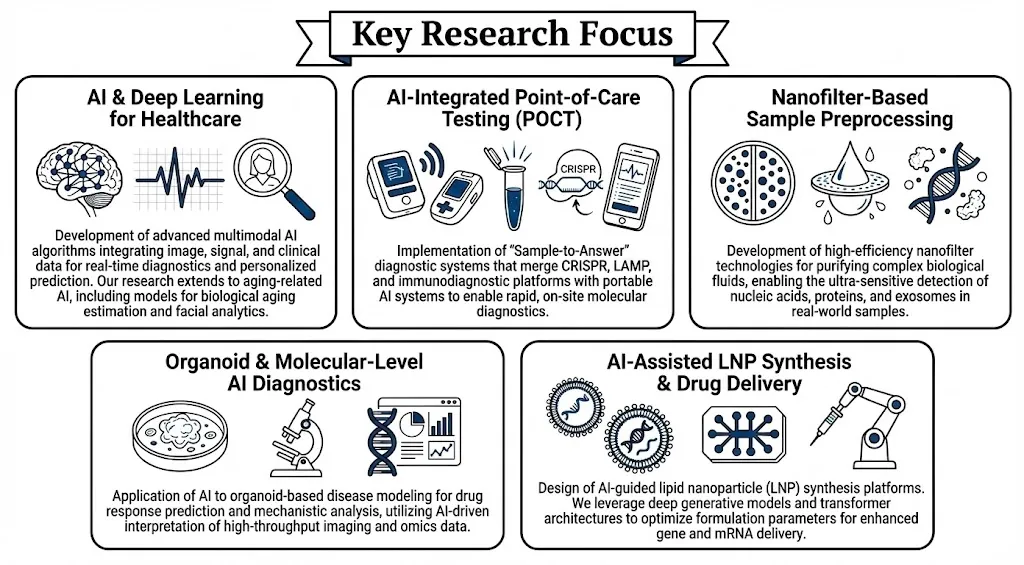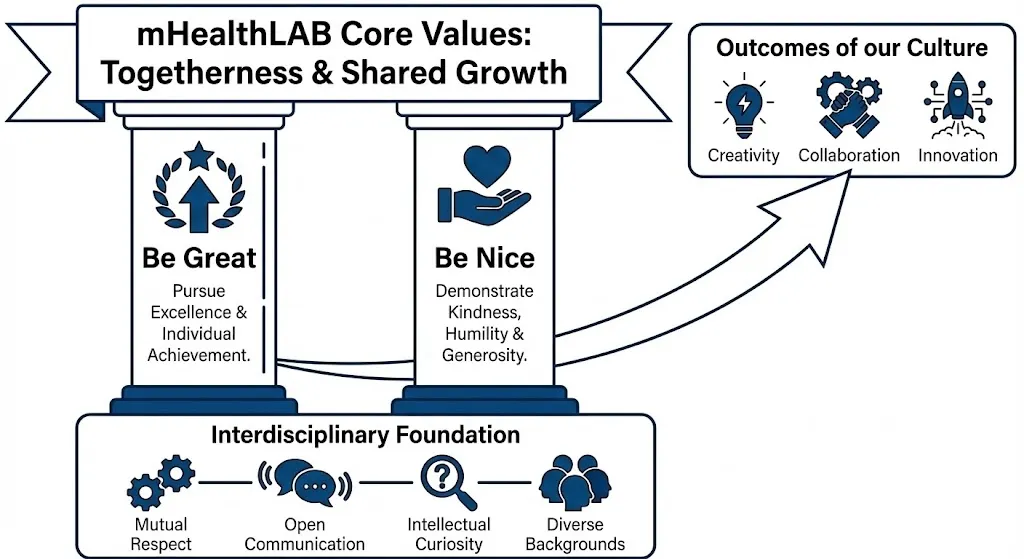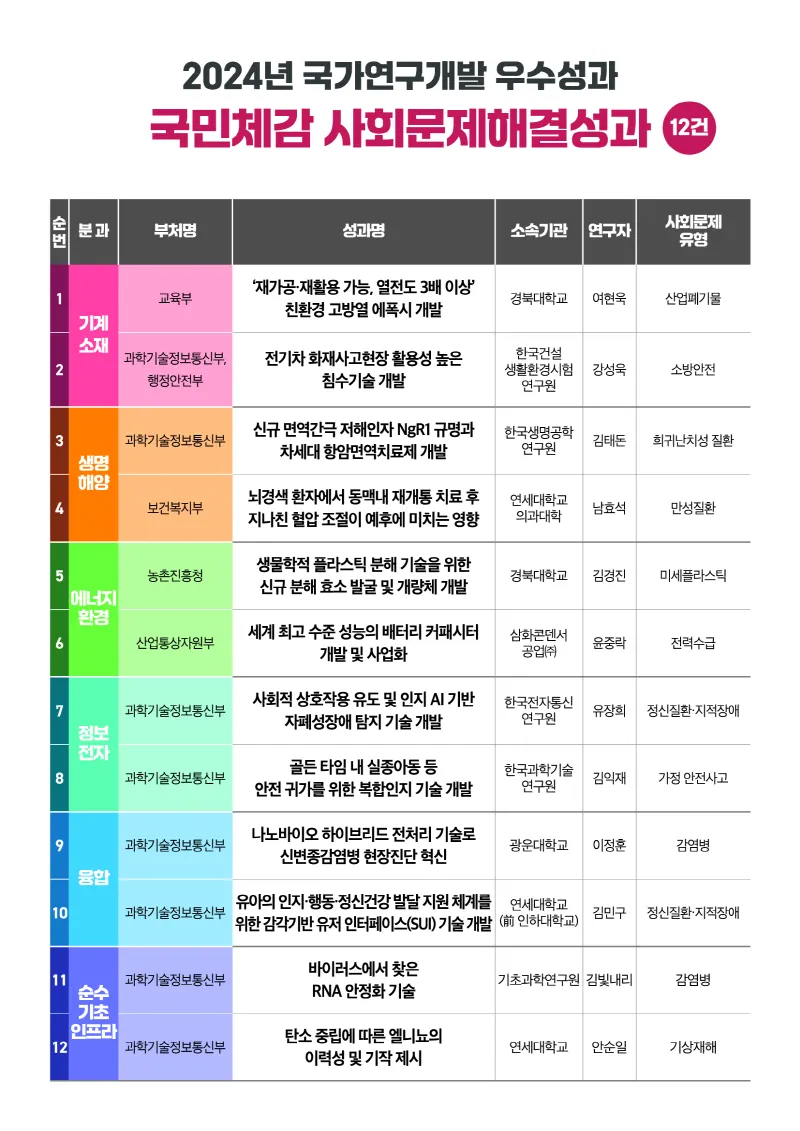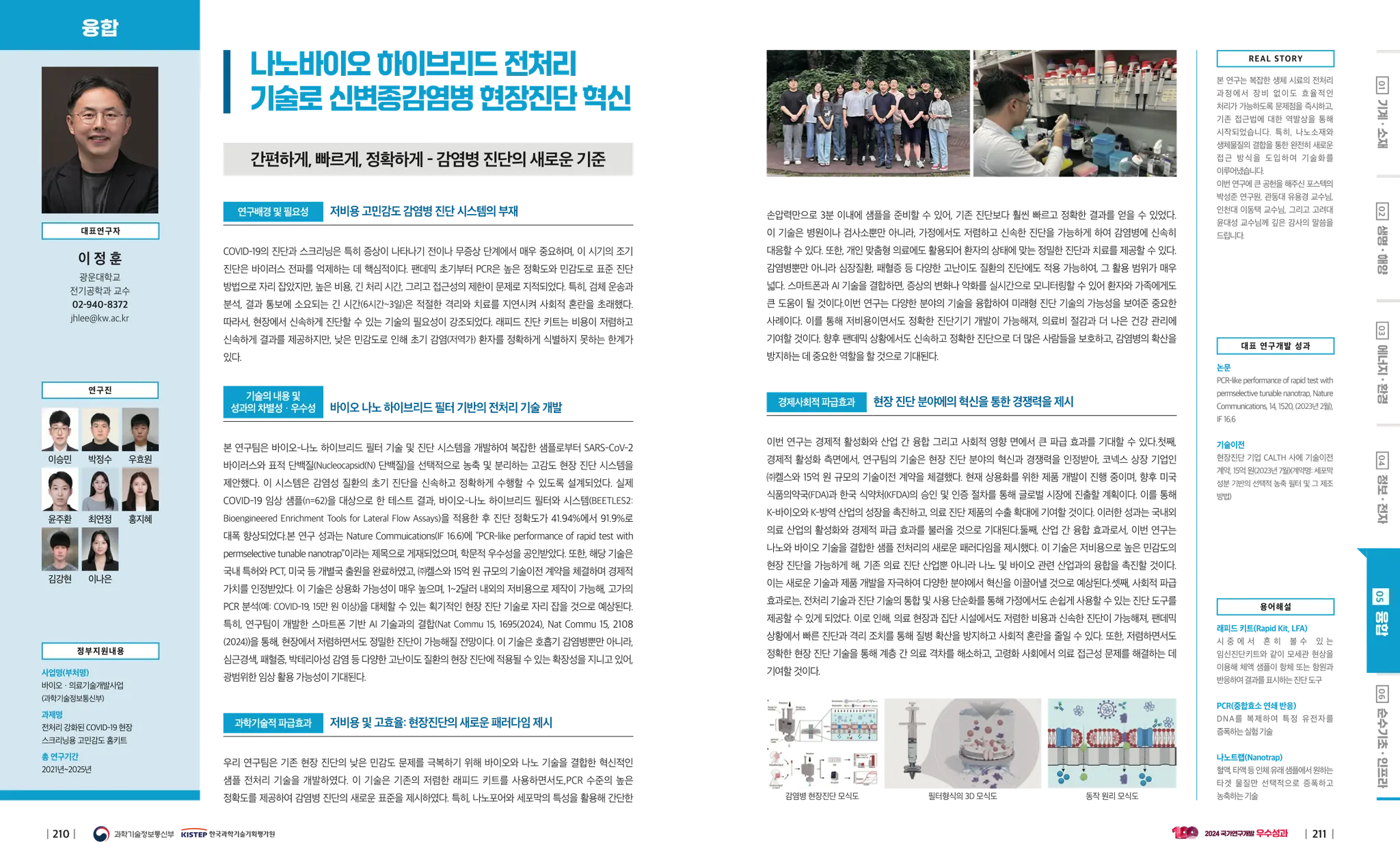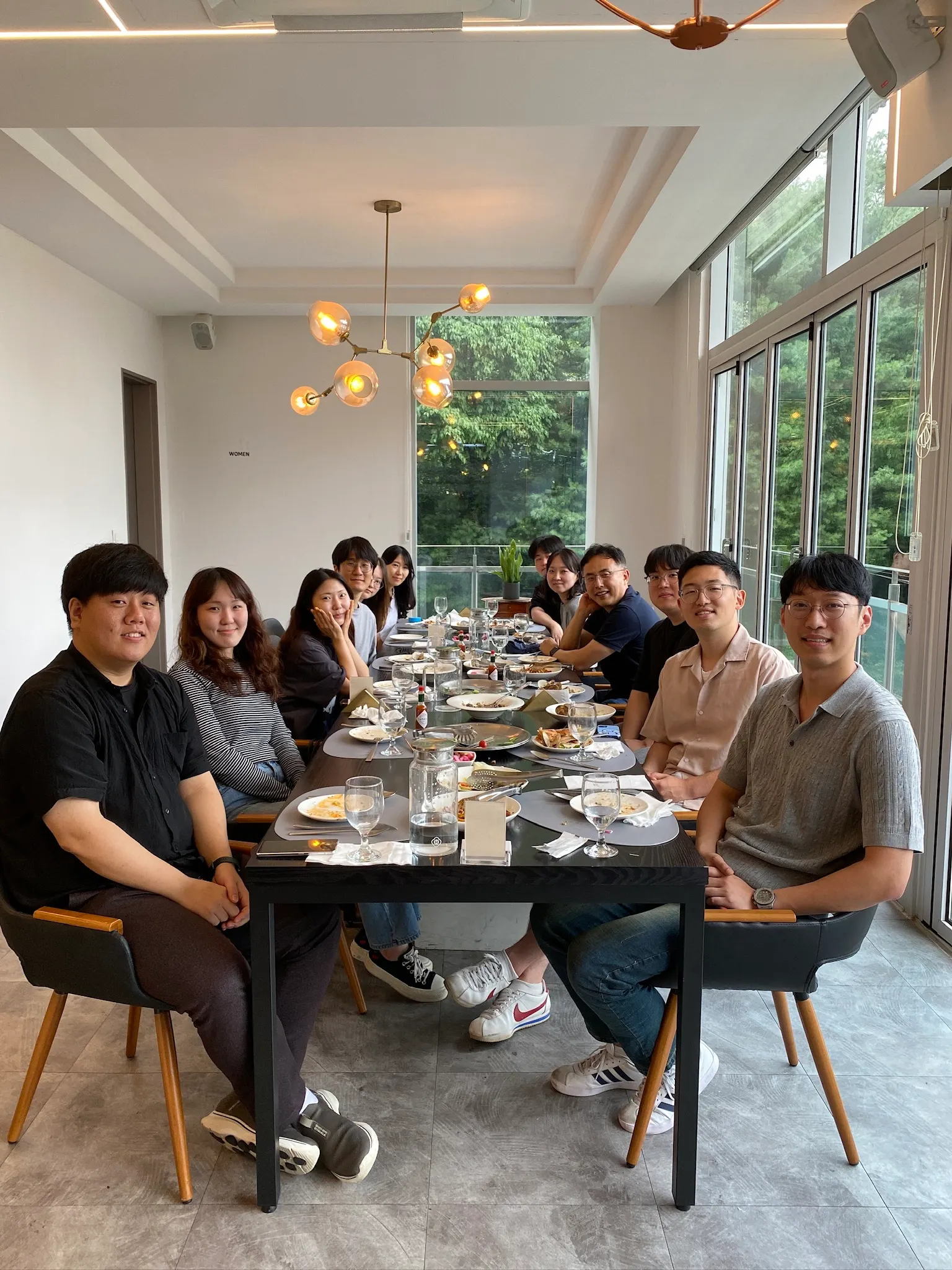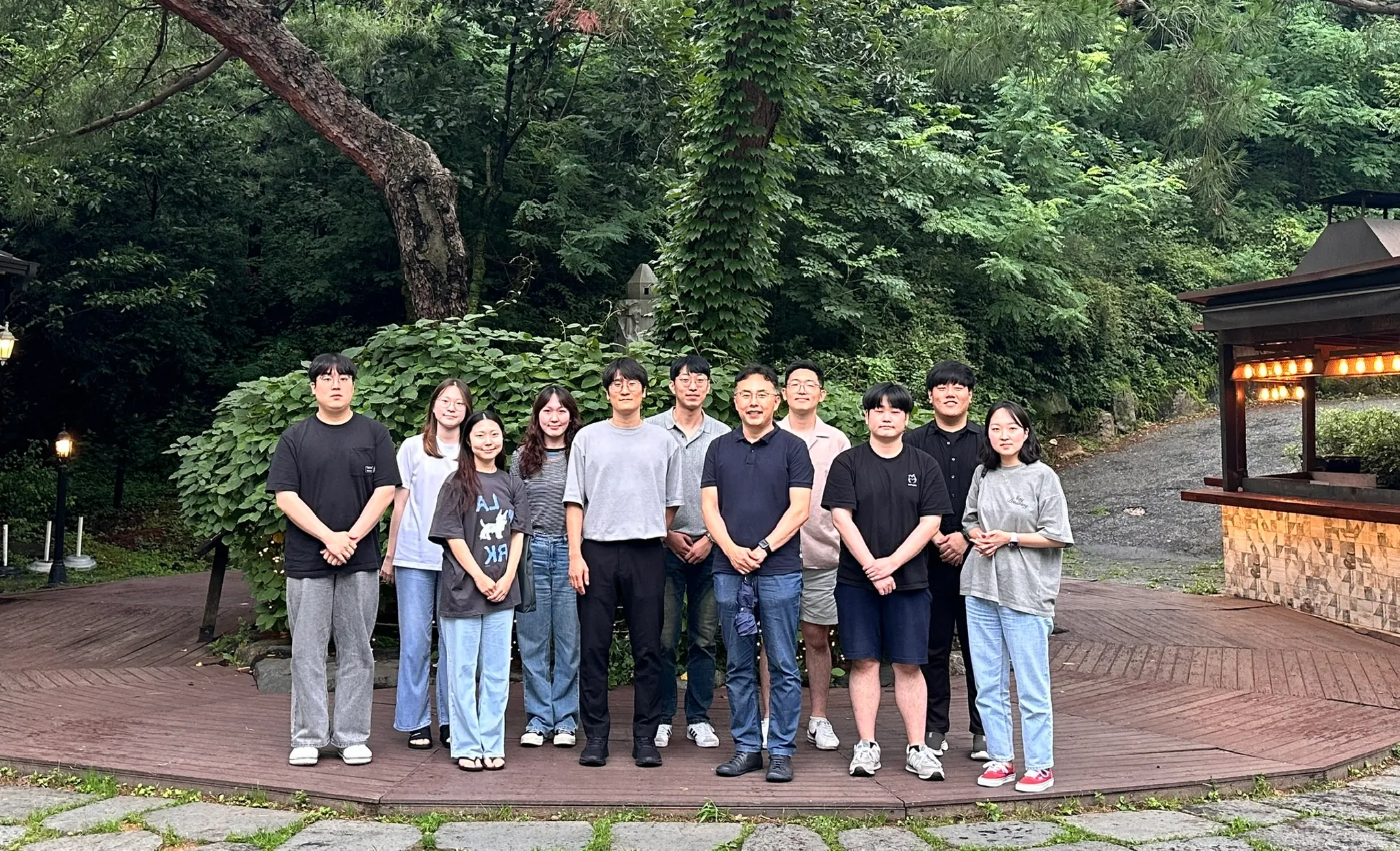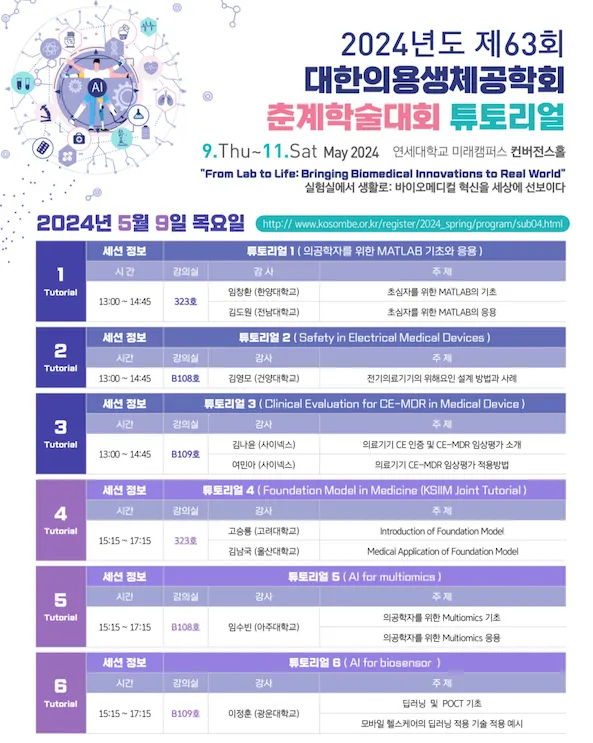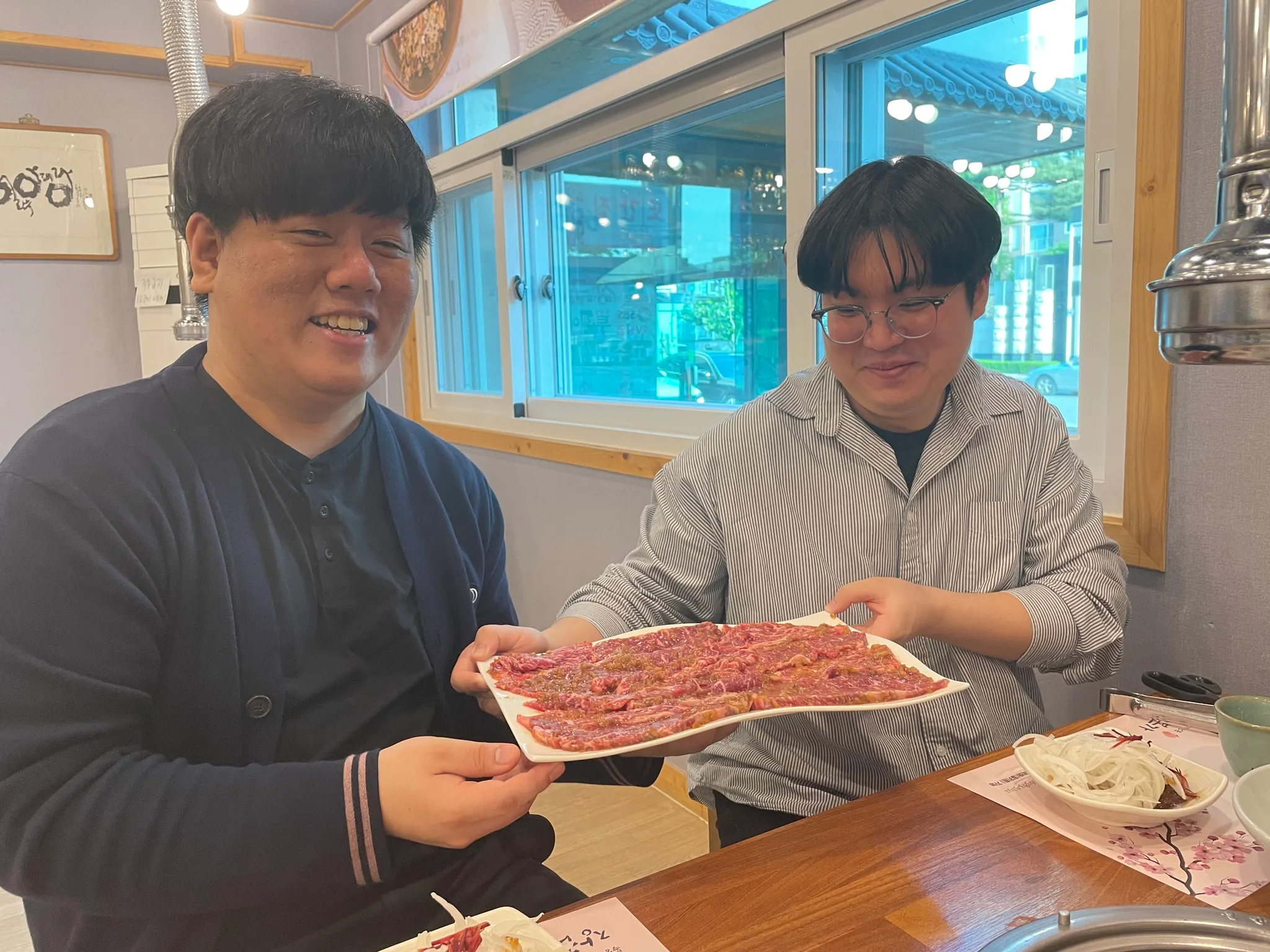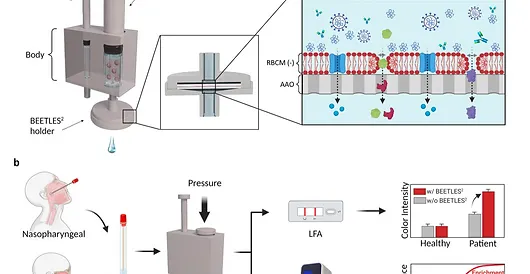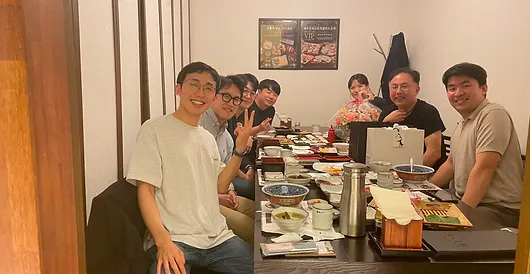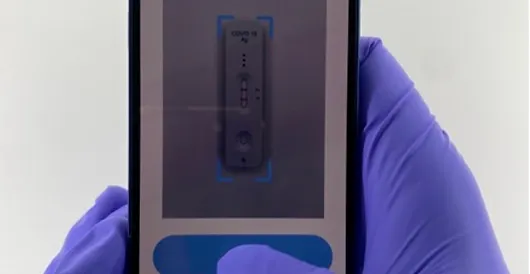고려대 이정훈 교수 연구실입니다.
Redefining 'm'Health: At the Convergence of AI and Bioscience.
The mHealth Lab stands at the forefront of health innovation, moving beyond mere connectivity to deep intelligence and biological insight. We redefine the 'm' in our name to represent a holistic approach: utilizing Machine-intelligent systems, integrating diverse Multi-modal datasets, and probing biological realities at the Micro/nano-scale. Our interdisciplinary team is committed to developing breakthrough technologies that enable truly personalized and preventative medicine.
Research Focus & Mission
Our mission is to build an intelligent, connected healthcare ecosystem by converging advanced AI, precision medicine, and cutting-edge sensing technologies. We translate complex biological and clinical data into real-time, actionable health insights.
Machine-intelligent Platforms
We develop robust AI systems tailored for biomedical applications, utilizing deep generative models and transformer architectures. By leveraging edge AI and federated learning, we ensure our solutions are privacy-preserving, low-power, and ready for practical field deployment.
Multi-modal Data Fusion
Our research integrates diverse data streams—combining mobile signals, medical imaging, and clinical records—through advanced multimodal learning. This fusion enables rapid, intelligent diagnostics and deeply personalized patient monitoring.
Micro/nano-scale Precision
We pioneer innovations at the intersection of bio and engineering, from nanofilter-based sample preprocessing and on-site molecular diagnostics to MEMS and SERS/Raman smart sensors. These technologies allow for precise, real-time biosignal interpretation.
Extending these innovations into physical AI for bio-applications, mHealthLAB is driving the next generation of predictive medicine, smart diagnostics, and optimized treatment strategies.
KU-KIST Graduate School of Converging Science and Technology
Department of Integrative Energy Engineering, College of Engineering
Welcome & Key Research Areas
Greeting from the Director
Welcome to mHealthLAB at Korea University, led by Professor Jeong Hoon Lee. Situated at the convergence of artificial intelligence (AI), biosensors, and precision diagnostics, our lab is dedicated to redefining the possibilities of next-generation healthcare. We aim to create seamless, intelligent health solutions through the integration of cutting-edge AI, advanced materials, and innovative sensor technologies.
Key Research Focus
Our specific research endeavors focus on the following critical areas:
•
AI & Deep Learning for Healthcare
Development of advanced multimodal AI algorithms integrating image, signal, and clinical data for real-time diagnostics and personalized prediction. Our research extends to aging-related AI, including models for biological aging estimation and facial analytics.
•
AI-Integrated Point-of-Care Testing (POCT)
Implementation of "Sample-to-Answer" diagnostic systems that merge CRISPR, LAMP, and immunodiagnostic platforms with portable AI systems to enable rapid, on-site molecular diagnostics.
•
Nanofilter-Based Sample Preprocessing
Development of high-efficiency nanofilter technologies for purifying complex biological fluids, enabling the ultra-sensitive detection of nucleic acids, proteins, and exosomes in real-world samples.
•
Organoid & Molecular-Level AI Diagnostics
Application of AI to organoid-based disease modeling for drug response prediction and mechanistic analysis, utilizing AI-driven interpretation of high-throughput imaging and omics data.
•
AI-Assisted LNP Synthesis & Drug Delivery
Design of AI-guided lipid nanoparticle (LNP) synthesis platforms. We leverage deep generative models and transformer architectures to optimize formulation parameters for enhanced gene and mRNA delivery.
Students We Seek to Join Our Lab “Be great, Be nice”
We value the spirit of togetherness and welcome students who embrace collaboration and shared growth. Members of our lab are encouraged to pursue excellence in their own fields (“Be Great”) while demonstrating
kindness, humility, and generosity (“Be Nice”) toward others. Because our work is inherently interdisciplinary, we place strong emphasis on mutual respect, open communication, and intellectual curiosity among researchers from diverse backgrounds. These values form the foundation for creativity, collaboration, and innovation at mHealthLAB.
#고려대 디지털헬스 #DigitalHealth@KoreaUniversity
#고려대 모바일헬스 #Mobile Health@KoreaUniversity
#고려대 인공지능 #AI@KoreaUniversity
#고려대 바이오센서 #biosensor@KoreaUniversity
#고려대 센서 #sensor@KoreaUniversity
LAB NEWS
2025/12 Congratulations! Two member’s joining!
HJ Kim and JS Hwang will be joining us in the Spring 2026 semester. Congratulations! Hyunjung will be conducting Raman research in the wet lab, and Junseok will be working on AI algorithms. Welcome to the team!
2025/12 @Meeting, Seoul National University Bundang Hospital (SNUBH)
We met with Professor Jong Chan Lee’s team from SNUBH and agreed to collaborate on pancreatic cancer research.
SNUBH의 이종찬 교수님 팀과 미팅을 했어요. 췌장암+AI 진단 연구 진행할 예정입니다.
2025/11 @BioChip conference, Jeju, Nov 12~14 2025.
2025/11 Lab lunch. 날씨가 너무 좋아서!
2025/08 Lab News. Outing with my students. (Although not present here,) let’s congratulate Seok Hyobin and Do Minho, who have joined us as new master’s students for the Fall 2025 semester! This semester, a total of three students (Seo Jangwon, Seok Hyobin, and Do Minho) have joined our group. By the way, the lucky fortune winner this time is Joo-hwan Yoon!
학생들과의 아웃팅 입니다. (이 자리에는 없지만) 2025년 2학기 신입생 석효빈 학생과 도민호 학생 (둘다 석사과정)의 입학을 축하합니다~ 이번학기는 총 3명의 학생(서장원, 석효빈, 도민호) 학생이 조인을 했네요. 참고로 럭키포츈(lucky fortune)은 윤주환 학생이 당첨되었어요!
2025/07 Lab News. Warm congratulations to Jangwon Seo on joining our lab as a Master’s student, and to our four new undergraduate researchers for starting their UROP journey with us!
서장원 학생의 석사입학과 4명 학생(동현, 현정, 지현, 지원)의 학부 인턴 조인을 환영합니다!
2025/05 Lab Outing. Warm congratulations to Seungmin Lee on the successful defense of his Ph.D. dissertation!
이승민 박사의 박사 디펜스 통과를 축하합니다!
2025/04 Congratulations to Prof. Jeong Hoon Lee on Prime Minister’s Commendation and Top 100 R&D Recognition! Professor Jeong Hoon Lee of the Department of Integrative Energy Engineering at the KU-KIST Graduate School, Korea University, has been awarded the Prime Minister’s Commendation at the 2025 National Science and ICT Day Ceremony.
이정훈 교수님이 ‘2025년 과학기술정보통신의 날’ 기념식에서 국무총리상을 수상했습니다. 우리나라 전체 과학기술 연구중 ‘2024 국가연구개발 우수성과 100선’에 선정되었고, 국민체감 사회문제해결성과 12에도 선정되었습니다. 우리 연구실은 사회문제를 해결하고 도움을 줄수 있는 기술에 집중하여 연구하고 있습니다.
Professor Lee was previously recognized with the Minister’s Commendation for being selected among the "Top 100 Outstanding National R&D Achievements of 2024" by the Ministry of Science and ICT. His groundbreaking contributions in pre-treatment technologies and deep learning-based diagnostics for bio-healthcare were key factors in this recognition. Following additional review, he has now received the prestigious Prime Minister’s Commendation, affirming both his academic excellence and technological innovation.
As the principal investigator of the National Core Technology Development Project for Emerging Infectious Disease Response (approx. KRW 4 billion in total funding), Professor Lee led pioneering research efforts. These included the publication of three papers as corresponding author in the internationally renowned journal Nature Communications and the successful transfer of technologies worth KRW 1.7 billion. These achievements demonstrate his ability to deliver world-class research outcomes.
This recognition stands as a testament to the global competitiveness of research at the KU-KIST Graduate School and is expected to contribute significantly not only to future preparedness for emerging infectious diseases but also to on-site diagnostics in regions such as Africa.
고려대 이정훈 교수, KU-KIST 융합대학원 (융합에너지공학과), 국무총리상 수상 및 국가연구개발 우수성과 100선 선정
2025/03 Congratulations to Seungmin and Jeong Soo on their New Paper! Our 115th paper, "Artificial Intelligence in Bacterial Diagnostics and Antimicrobial Susceptibility Testing: Current Advances and Future Prospects," is now in Biosensors & Bioelectronics. This review explores AI's role in improving bacterial diagnostics. Congratulations to all authors! (IF: 10.7, JCR Top 2.4%)
이승민 학생과 박정수 학생의 새로운 논문이 출판되었어요. 인공지능을 활용한 박테리아 연구 리뷰논문입니다. AI, 딥러닝등을 통한 전체 연구동향을 살펴볼수 있는 잘 정리된 리뷰 논문입니다.
2025/03 Congratulations to Jeong Soo and Ji Hye on their New Paper! We're thrilled to share that Jeong Soo and Ji Hye's latest research has been published in Biosensors & Bioelectronics. Their Biosensors & Bioelectronics paper achieves enhanced sensitivity via flow/concentration control, solving prior binding issues. Congrats! Congratulations to all authors! (IF: 10.7, JCR Top 2.4%)
박정수 학생과 홍지혜 학생의 새로운 논문이 출판되었어요. 현장진단 키트의 민감도를 높이기 위한 아이디어 인데, 육안관찰시 수십 마이크로의 표면만의 신호를 본다는 사실에 기초해서 표면에 유속제어를 통한 농축을 통해 민감도 혁신을 가져온 기술입니다.
2025/03 Welcome Suh Yoon Choo! "Welcome Suh Yoon Choo to the lab! We look forward to her contributions as she pursues her Ph.D."
추서윤 학생의 박사 입학을 축하해요!!
2025/02 Congratulations to Seungmin Lee on being awarded the 22nd Presidential Scholarship! This year, a total of 120 students were selected (50 master's and 70 doctoral students), with a highly competitive acceptance rate of approximately 25:1. Among them, only nine students (three master's and six doctoral) were selected in the Bio-Medical Convergence field.
이승민 학생이 대통령 장학생으로 선정되었습니다! 축하합니다!
2025/01 It was selected as the Ministry of Science and ICT Minister's Awards and recognized as one of the Top 12 Achievements in Solving Social Issues among the Top 100 Outstanding National R&D Achievements of 2024. 
고려대 이정훈 교수, 과기부장관상, 국민체감 사회문제해결 성과 12선, 2024 국가연구개발 우수성과 100선에 선정되었어요 
Nov 2024: Our paper has been published in Advanced Science. 
Dr. Naeun Lee's paper, titled 'Enhancing RT-PCR Throughput and Sensitivity Through Large-Scale Sample Pooling Using a Nano-Hybrid Membrane,' has been accepted in Advanced Science! Congratulations!
During the recent pandemic, there was a high demand for group testing. For example, for large-scale entries like airplane arrivals, pooling techniques, where samples are combined and tested at once rather than individually, were proposed as an alternative. However, there were limitations to diagnosis via pooling due to equipment sensitivity, especially when 99 out of 100 people were negative, and only one was positive. This paper proposes a technology that overcomes these challenges by utilizing our Beatles technology!
이나은 박사의 논문이 출판되었어요. 축하합니다!!
2024/10 Congratulations on being selected as one of the Top 100 Outstanding National R&D Achievements! (Oct, 2024)
이정훈 교수님의 연구가 2024 국가연구개발 우수성과 100선에 선정되었어요.
Our paper and technology transfer achievements for 'Sample-to-answer Platform for the Clinical Evaluation of COVID-19 using a Deep Learning-assisted Smartphone-based Assay,' Nature Communications (2023) 14: 2361, have been selected as one of the top 100 national R&D achievements in South Korea for 2024!
This selection is in the interdisciplinary field and under the Ministry of Science and ICT's (Social Problem Solving Achievement) category, 'Innovation in On-site Diagnosis of Emerging Infectious Diseases Using Nano-bio Hybrid Preprocessing Technology.'
2024/07 Lab Outing (July 09, 2024) 
The lab members enjoyed a lab outing together. I didn't realize there were places like this in Seoul. Jeong Soo Park won the lucky ladder raffle (dinner for two, sponsored by Professor Jeong Hoon Lee)
May 17, 2024: Congratulations to Naeun Lee on successfully defending her PhD! 
Congratulations on successfully completing your Ph.D. thesis, titled 'Biological Sample Enrichment using Nano-Hybrid Membrane for Advanced Molecular Diagnostics'! Well done on finishing your research
May 9, 2024: Presented at the tutorial session during the Spring Conference of
KOSOMBE. 
Hyowon Woo and Jeong Soo Park assisted with the lab practice on Deep Learning and POCT Basics, and Mobile Healthcare Deep Learning Applications. :-)
April 2024: Our lab's PhD student, Seungmin Lee, has been proudly selected as the first recipient of the Presidential Science Scholarship.
March 2024: Dr. Dohwan Lee, a former member of our lab, has been appointed as an Assistant Professor in the Department of Electrical Engineering at Kwangwoon University. 
March 2024: Our paper has been published in Nature Communications. 
The research by Dr. Dongtak Lee and student Hyogi Jeong, titled 'Bioengineered amyloid peptide for rapid screening of inhibitors against main protease of SARS-CoV-2' Nat Commun 15, 2108 (2024), has been published in Nature Communications. This model uses nanoparticles to screen drugs for diseases like COVID-19.
February 2024: Our paper has been published in Analytical Chemistry. 
The research by student Naeun Lee, titled 'Enhancing Loop-Mediated Isothermal Amplification through Nonpowered Nanoelectric Preconcentration' Anal. Chem. 2024, 96, 9, 3844–3852, has been published in Analytical Chemistry. This research enables on-site molecular diagnostics through a nanoelectronic preconcentration system.
February 2024: Our paper has been published in Nature Communications. 
The research by Seungmin Lee, Jeong Soo Park, and Hyowon Woo, titled 'Rapid Deep Learning-Assisted Predictive Diagnostics for Point-of-Care Testing' Nature Communications (2024) 15:1695, has been published in Nature Communications. This is a groundbreaking technology that can complete diagnoses that typically take several hours in just 1-2 minutes through a completely novel time-series deep learning approach.
January 2024: Congratulations to Juhwan and Yeonjeong on starting their Master’s program! 
In 2023, Ju-hwan and Yeon-jeong each completed approximately six months as undergraduate researchers. Subsequently, they enrolled in the Master's program. They started their Master's studies from the spring semester of 2024
July 2023: Technology transfer of 1.5 billion KRW (BEETLES)
•
2023-07-31 하이브리드세포막을 이용한 비틀즈 기술이 기술이전 되었어요. 기술이전 액수는 15억원입니다. 우리 실험실에서 개발한 세포막을 이용한 샘플 전처리 시스템 (BEETLES^2)의 특허가 (주)켈스에 총 15억의 금액으로 기술이전되었습니다.
•
단일 특허 이전액으로는 실험실 자체 최대 금액입니다. 기반이 되는 기술은 Nature Communications| (2023)14:1520이며, 두건의 특허를 포함한 기술이 이전되었습니다.
•
의의: 본 특허는 면역진단있어서 민감도를 크게 향상시키는 기술로서, 실제 전처리 기술만으로 PCR등의 분자진단 민감도를 확보했다는데 그 의의가 있습니다. 또한 면역진단에 국한된것이 아닌, 분자진단의 전처리로서도 그 가능성이 매우 크며, 아주 새로운 고성능 전처리 시스템(농축/필터)의 영역의 가능성을 입증하였습니다.
May 2023: Lab alumni gathering 
•
졸업생들의 사회생활을 응원합니다!
•
이경재 학생은 FuriosaAI로 자리를 옮겼네요. AI GPU 만드는 유망업체라고 하네요.
April 2023: Our paper has been published in Nature Communications. 
“Sample-to-answer Platform for the Clinical Evaluation of COVID-19 using a Deep Learning-assisted Smartphone-based Assay,” Nature Communications (2023)14: 2361
•
이승민, 김선목 학생과 여러 친구들이 함께 연구한 결과가 네이쳐 커뮤니케이션에 출판되었습니다.
•
의의: 딥러닝 알고리즘을 통해 처음으로 스마프폰의 기종, 래피드키트 종류, 조명, 환경에 영향을 받지 않고 현장진단이 가능한 최조의 결과를 보고하였습니다.
March 2023: Our paper has been published in Nature Communications. 
•
"PCR-like Performance of Rapid Test with Permselective Tunable Nanotrap," Nature Communications(2023)14:1520
•
박성준, 이승민, 이동택 박사가 주도적으로 연구를 시행하였습니다.
•
의의: 현장진단 및 분자진단에 있어서 PCR과 같은 증폭없이 나노하이브리드 비틀즈 멤브레인만을 통해 빠르고 효율적으로 농축가능하며, 이를 통해 민감도를 혁신적으로 올릴수 있는 소자 및 시스템을 개발하였다는데 큰 의의가 있습니다.
January 2023: A gathering of UROP students and lab members. 
November 2022: Smartphone AI technology has been transferred. 
•
스마트폰을 활용한 AI기술의 기술이전이 완료되었습니다.
•
기술이전 금액은 1.2억입니다. 추가 최적화를 통해 상용화 예정입니다.
June 2022: Our COVID-19 diagnostics research has been published in Biosensors and Bioelectronics (BSBE). 
•
Nanoelectrokinetic-assisted lateral flow assay for COVID-19 antibody test
November 2021: CALTH Inc. was listed on the KONEX. 
•
공동창업 기업인 (주)켈스 CALTH Inc. 가 코넥스 시장에 상장하였습니다.
•
코넥스시장은 코스피, 코스닥과 함께 제3의 거래시장입니다. 코넥스를 발판삼아 코스닥 상장을 도전합니다!
2008 by mobile health & sensor lab (mHealthLab)

